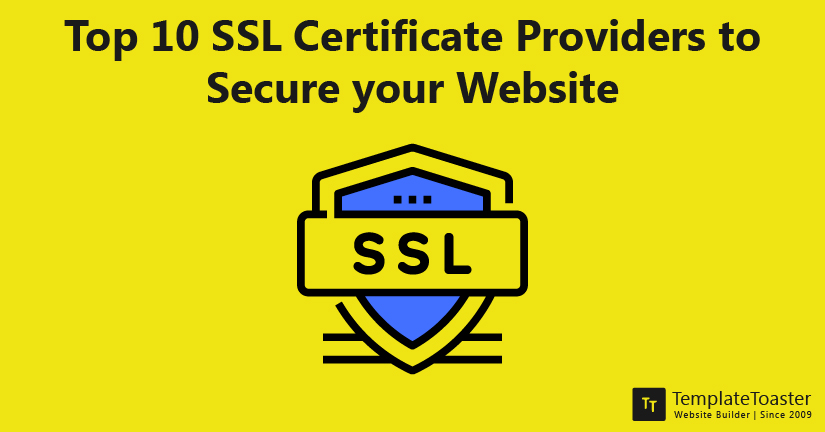Best SSL Certificate Providers for Websites
Securing a website today isn’t just about compliance it’s about trust, search visibility, and protecting your users’ data. One of the simplest and most effective ways to safeguard online communication is through SSL (Secure Sockets Layer) certificates. These digital certificates enable encrypted connections and ensure that any data exchanged between the browser and server remains private.
Looking for the best SSL certificate providers for websites? This comprehensive guide compares top SSL vendors like Sectigo, DigiCert, GlobalSign, and Let’s Encrypt to help you choose the right one for your site. Learn why SSL is essential for security, trust, and SEO, and explore the pros and cons of free vs paid SSL options. Whether you’re running a personal blog, an online store, or a business site, this article helps you secure your website with confidence.
But not all SSL providers offer the same level of security, features, or trust. The best SSL certificate providers for websites are those that combine robust encryption, browser compatibility, easy management, and exceptional support. In this article, we highlight top-rated SSL vendors and help you decide which one fits your website’s needs best.
Table of Contents
- Introduction
- What is an SSL Certificate?
- Why You Need an SSL Certificate
- Best SSL Certificate Providers for Websites (2025 Comparison)
- Sectigo (formerly Comodo SSL)
- DigiCert
- GlobalSign
- GoDaddy SSL
- SSL.com
- Entrust
- Namecheap SSL
- Let’s Encrypt
- Free vs Paid SSL Certificate Providers
- How to Choose the Right SSL Provider
- FAQs: SSL Certificate Providers for Websites
What is an SSL Certificate?
An SSL certificate is a security protocol that ensures a safe, encrypted connection between a website and its visitors. It converts your website from HTTP to HTTPS and activates a padlock icon in the browser, signaling that users can interact with your site safely. SSL certificates are now a must-have for any site dealing with login credentials, payment details, or personal information.
Beyond encryption, SSL certificates also contribute to your brand’s trust factor. They help prevent phishing attacks, support your SEO rankings, and improve conversion rates by providing assurance to visitors that they are on a legitimate site.
Key points:
- SSL encrypts communication between browsers and servers
- Boosts SEO and eliminates “Not Secure” browser warnings
- Enables HTTPS and the padlock icon
- Helps meet privacy and compliance standards (GDPR, PCI DSS, HIPAA)
- Trusted by Google for secure search rankings

Why You Need an SSL Certificate
Having an SSL certificate is essential, not optional. It protects your website visitors from potential threats, including man-in-the-middle attacks, data theft, and phishing. Even basic sites benefit from SSL since most browsers flag non-HTTPS websites as insecure, which can discourage users from continuing.
From securing login pages to protecting checkout processes, SSL plays a vital role in website integrity. If your website collects any form of data—or simply wants to be taken seriously by users and search engines you need SSL protection from a reliable provider.
Reasons to secure your website with SSL:
- Prevents sensitive data interception
- Builds trust and credibility among visitors
- Avoids browser security warnings and red flags
- Helps comply with industry and privacy regulations
- Offers a slight performance boost via HTTP/2 support on secure sites
Best SSL Certificate Providers for Websites
Choosing an SSL provider is more than picking a certificate. You’re choosing a partner in your website’s security journey. Below are the most trusted and highly rated SSL providers of 2025, each offering unique benefits for different use cases.
1. Sectigo (formerly Comodo SSL)
Sectigo is a long-established SSL certificate authority known for its broad coverage, high compatibility, and flexible options. It offers certificates for all types of websites, from personal blogs to high-volume eCommerce platforms. The provider emphasizes automation and ease of deployment, making it a favorite for both individuals and IT professionals.
Highlights:
- Offers DV, OV, EV, Wildcard, and Multi-Domain certificates
- Trusted by all major browsers and mobile platforms
- Automated validation and fast issuance
- Includes dynamic trust seals to boost user confidence
- Excellent choice for scalability and enterprise compatibility
2. DigiCert
DigiCert is a leader in high-assurance SSL certificates and enterprise-grade digital security solutions. It powers the encryption behind many Fortune 500 websites and offers features specifically designed for large businesses that require top-tier security and trust.
Features:
- Premium-level OV and EV SSL certificates
- Prioritizes high performance and strong encryption standards
- Fast validation and issuance turnaround
- Trusted by major enterprises and financial institutions
- Supports certificate lifecycle management and automation

Don’t overpay for an EV certificate if you’re running a personal blog. Likewise, don’t rely on free SSL if you’re managing a customer-facing eCommerce site. Align your SSL choice with the nature of your website.
3. GlobalSign
GlobalSign focuses on scalable security solutions for organizations with complex IT environments. It provides full lifecycle management for SSL certificates and integrates with enterprise systems like Active Directory and cloud platforms, offering robust automation and advanced identity verification.
Pros:
- Designed for businesses needing high scalability and automation
- Seamlessly integrates with DevOps and cloud-based workflows
- Offers OV, EV, Wildcard, and SAN SSL certificates
- Emphasizes identity assurance and regulatory compliance
- Known for top-tier enterprise support
4. GoDaddy SSL
GoDaddy offers SSL certificates that are easy to set up and manage, especially if you already use their hosting or domain services. It’s a go-to for small businesses and individuals looking for a convenient all-in-one solution.
Best For:
- User-friendly dashboard and one-click SSL integration
- Offers basic DV to high-assurance EV certificates
- Works seamlessly with GoDaddy hosting and domains
- Includes a security seal and malware scanning in some plans
- Responsive 24/7 support available via chat or phone
5. SSL.com
SSL.com offers a solid mix of affordability and capability, making it a preferred choice for developers, agencies, and businesses alike. Its certificates are easy to implement and cover a wide variety of needs, including code and document signing.
Edges:
- Great value with high browser compatibility
- Provides DV, OV, EV, Wildcard, and Multi-Domain SSL
- Offers additional options like S/MIME and code signing certificates
- Helpful documentation and knowledgeable support
- Fast issuance and renewal process

Verify your hosting environment supports your SSL provider’s certificate and installation method especially if you’re using shared hosting or older server setups.
6. Entrust
Entrust is highly trusted in industries with strict regulatory and security requirements, such as government and banking. It delivers powerful encryption and extensive identity verification, often bundled with advanced authentication tools.
Famous For:
- Designed for high-trust enterprise environments
- Supports PKI, identity, and access management integrations
- Strong warranties and compliance guarantees
- Offers EV and multi-domain certificates for critical infrastructure
- Excellent support for risk-sensitive industries
7. Namecheap SSL
Namecheap’s SSL services are popular among budget-conscious users and developers who need quick, affordable security. It provides a user-friendly experience and competitive features, especially for personal projects or small websites.
Features:
- Affordable SSL options without compromising on encryption
- Easy to purchase, activate, and renew
- Offers DV, OV, and Wildcard certificates
- Trusted certificate authorities behind each offering
- Suitable for freelancers, startups, and dev environments
8. Let’s Encrypt
Let’s Encrypt offers completely free SSL certificates with automated issuance and renewal processes. While these certificates are domain-validated only and offer no warranty, they provide solid basic encryption that’s perfect for low-risk sites. Its very easy to setup Let’s Encryp on your website.
Highlights:
- Free, open-source Certificate Authority (CA)
- Domain-validated SSL only, no OV/EV support
- Easy automation via Certbot or web server plugins
- Short 90-day validity with auto-renewal options
- Trusted by most modern browsers and systems
Free vs Paid SSL Certificate Providers
Free SSL options like Let’s Encrypt are great for blogs, small websites, or temporary projects where minimal risk is involved. But they often lack features like warranties, support, and higher validation levels.
Paid SSL certificates, on the other hand, are necessary for eCommerce sites, portals that collect user information, or sites operating under regulatory constraints. These providers offer extended support, legal assurance, and brand-building tools like trust seals.
Comparison points:
- Free SSL is ideal for low-risk or personal websites
- Paid SSL provides validation, support, warranties, and seals
- Paid certificates are preferred by eCommerce and regulated industries
- Some free SSL options lack automation support on shared hosting
How to Choose the Right SSL Provider
Your SSL provider should match the level of security and trust your users expect. A simple blog may only need a DV certificate, while a financial portal may require EV with business validation and compliance coverage.
What to consider:
- The type of website and sensitivity of user data
- Whether you need support for multiple domains or subdomains
- Required level of trust (DV, OV, EV)
- Automation support and renewal process
- Customer service and warranty offerings
FAQs: SSL Certificate Providers for Websites
Q1: Are SSL certificates transferable between hosting providers?
Yes. You can export your SSL certificate and private key from one hosting environment and install them on another, provided the domain remains the same.
Q2: Do Wildcard SSL certificates support multiple levels of subdomains?
No. Wildcard SSLs only secure one level of subdomains (e.g., *.example.com). If you need to secure multiple subdomain levels, consider a multi-domain or SAN certificate.
Q3: How often should I renew an SSL certificate?
Most certificates are valid for 1 year, though some providers offer multi-year plans (still requiring annual revalidation). Free certificates like Let’s Encrypt require renewal every 90 days.
Q4: What are Certificate Transparency logs, and why do they matter?
Certificate Transparency (CT) logs are public records of SSL certificates issued. They help detect misissuance or fraud and are required by most browsers for trust validation.
Q5: Do I need a dedicated IP address for SSL?
Not necessarily. Modern servers support SNI (Server Name Indication), which allows multiple SSL certificates on a single IP. However, some older systems may still require a dedicated IP.
Q6: What happens if my site has mixed content warnings even with SSL?
This occurs when some resources (e.g., images, scripts) load over HTTP. Update these to HTTPS to eliminate browser security warnings and fully secure your pages.
For WordPress users who want to further strengthen their website’s security and simplify SSL management, may want to explore some of the best SSL plugins for WordPress, which can help automate redirects, force HTTPS, and fix mixed content issues with ease. If you’re still unsure how to apply your certificate, follow our step-by-step guide on how to install an SSL certificate on a WordPress website to ensure everything is configured properly.
Build a Stunning Website in Minutes with TemplateToaster Website Builder
Create Your Own Website Now
This article clarified a lot for me especially the part about wildcard and multi-domain SSLs. I was using Let’s Encrypt, but now thinking of switching to Sectigo for my client sites. Great comparison.